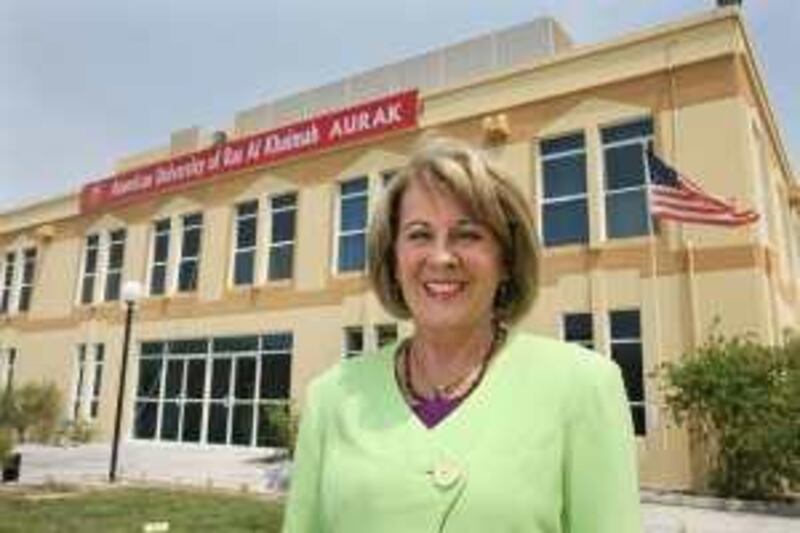Ras al Khaimah // It is orientation week at the American University of Ras al Khaimah, and new students are being asked to tell the lecturer what they know about the emirate. One calls out "goats", another suggests "forts", while a staff member at the back shouts "camels".
It is perhaps a surprise that no one mentions universities, since RAK has become an important centre of tertiary education in recent years. There are more than a dozen universities in the emirate, many attracted by the chance to operate under free zone rules, which exempt them from needing a licence and accreditation from the federal Ministry of Higher Education and Scientific Research. AURAK is the latest entrant to the market, taking over the operations of George Mason University, which closed earlier this year after failing to agree on funding levels with the RAK Government. Classes at AU RAK began yesterday.
Like George Mason, American University RAK is subsidised by the emirate's government and licensed by the ministry. Although George Mason struggled to recruit students and never became fully established, there are signs the RAK Government is working to help its new institution succeed. Builders are constructing two large halls of residence and a student centre that will contain the recreational facilities to make it a "real campus", in the words of the university president, Prof Sharon Siverts.
The new accommodation means students will no longer be scattered in villas away from the university. In addition, the old George Mason buildings, originally built for RAK Men's College, have been refurbished. Prof Siverts describes the new operation as "a tremendous commitment" from the RAK Government. "We're really at an exciting time. We have to work to maximise our strengths and create an entity that's valued. We have that potential."
The key will be ensuring academic standards are high, according to Prof Siverts. English-language requirements have been relaxed finding students with the necessary language skills was a major challenge for George Mason but Prof Siverts insists academic requirements have not been lowered. Staff have gone through an intensive summer programme to ensure teaching standards are high. "We want to be tops in teaching so the students get a very high-quality education where they're engaged and they're learning," she said.
George Mason began degree courses in RAK in 2006 and its first bachelor's enrolment of 40 was one-fifth of the expected figure. After three years there were 118 students. About 55 of the George Mason students have stayed on and will receive both AURAK and George Mason degrees. Most of the others have travelled to George Mason's home campus in Virginia. There are about 30 new students. Prof Siverts said recruitment had been hampered by the late start, with only three months to generate interest. Among the student body of 85 or so, nearly 20 countries are represented, including the UAE, Yemen, Nigeria, Pakistan, India and the United States.
The school offers three bachelor's degree courses business administration, electronics and communications engineering, and biology with new undergraduate and postgraduate programmes set for launch next year. "We're small and that brings a lot of advantages. We get to know people. We know if something's wrong," said Prof Siverts, who spent a year running the George Mason branch in RAK, and returned to the UAE to launch the new university.
Among the students who remained is Salah Hafiz, 26, a third-year electronics and communications engineering student from Egypt. He admits to feeling "very sad" when he heard in February that George Mason was pulling out. "At the beginning it was a surprise and I'm not sure a good surprise," he said. "I thought I had lost these two years of my life, and I didn't expect AURAK to be that good. "But in the last few months they have done a lot of things. Everything seems serious more serious than before.
"Also, they have the same curriculum, the same staff and the same academic standards. Almost everything will be the same, but with a lot of improvements." One stumbling block in recruiting students cited by George Mason was the university's location in a quieter emirate away from the bright lights of Dubai. Prof Siverts hopes the much improved facilities will make campus life more interesting and enjoyable. Also, she says Dubai "is only an hour away" so students can visit easily at weekends, while RAK is good for outdoor activities such as kayaking and mountain climbing.
Lower English-language requirements are designed to attract students, along with modest fees Dh20,000 (US$5,445) for each of the two terms per year which are typically discounted through scholarships. Ultimately, AURAK hopes such incentives will help it outgrow its current campus situated on the eastern edge of the emirate's urban area. Prof Siverts hopes to have more than 500 students within two to three years, close to capacity. Then the university will look at building a facility beside Emirates Road for several thousand students.
"When you are in RAK, you really look to identify the things that would make a difference for people to come here," Prof Siverts said. "Part of that is residence halls and a real campus, a place where students can sit outside and walk outside and interact. "But there's a lot to be said for universities in small towns if you look around the world. We'll build on that." dbardsley@thenational.ae







